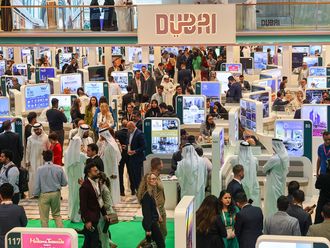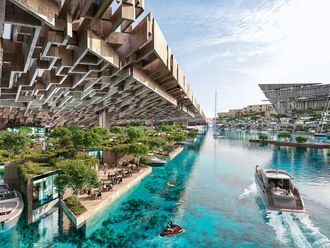Dubai: A state-of-the-art convention centre, a proactive convention bureau, room capacity and infrastructure will take you only so far when it comes to winning bids to host the biggest conferences in the world. Experts say that a comprehensive strategy which includes all stakeholders — government departments, associations, hotels and destination management companies — is the first step in making your city a convention hotspot. The others include: Be there
The right place and the right time are important. For the Dubai Convention Bureau (DCB) it meant hosting a four-day visit for the International Congress & Convention Association’s (ICCA) Executive Committee. Steen Jakobsen, Director, Dubai Convention Bureau says as ICCA’s 3rd Vice President he offered to host the meeting because of the impact it is likely to have.
“The management committee of ICCA has four meetings every year. The mission is to take ICCA to the members by locating the meetings in various places around the world to do advocacy work for the meetings industry. I raised my hand and said I am happy to host this meeting in Dubai because I know the impact it could have,” Jakobsen says.
It worked, since it got all stakeholders — who are often competitors — together in one room to discuss how to work together as a destination.
Wear their shoes
Understand what the decision-makers are looking to achieve, says Martin Sirk, CEO of ICCA. “The tourism and cultural appeal of a destination is more like the wrapping paper of the gift. The real thing is the business objectives of that community, whether they are doctors, scientists or traders,” Sirk says.
Citing the example of a recent medical conference, he says, “The organisers said that the reason they chose to come here was because there was a very low ratio of professionals to population throughout the wide region. They saw this region as where there is connectivity and at its heart there was a problem to be solved. They did not come here for the beaches and the lovely buildings.”
“With associations, it’s a bidding process. You have to find out what the objective of the association is and how you work with local partners to attract that event in. You find out what problem they are trying to solve, what business opportunity they are looking at.”
Embrace your competition
A convention strategy requires various stakeholders not only within the city but also within the broader region to work together, says Nina Pretorius, CEO, The Conference Company, South Africa and ICCA’s 2nd Vice President. “In South Africa we specialise in the association market. We put bids together, winning them for our country. Obviously, we see Dubai as competition but, potentially, also as an ally. There are close links between Africa and the Middle East and a number of corporate clients would see us as representative of the region,” she says, adding that the air connectivity would be an additional benefit in working together to get business to the region.
“It would be really great if we could get an association event and get a regional rotation. Perhaps they could come to Dubai and they could then go to Nigeria, go to Kenya, come to South Africa, next might be Doha, then Abu Dhabi,” she says. It helps that associations such as ICCA are now looking at regions outside of Europe and the United States of America. Regionally, the GCC countries can work together with simple steps such a single visa for visitor across the region. Jakobsen says that Dubai being a part of the World Cities Alliance is an example of beneficial partnership.
“If there is an event in Dubai that we know is looking for another destination, say in Africa, we will do all we can to push Cape Town, which is also a member. And we know that nine other partners would do the same to push for Dubai if a meeting is looking for a city in the Middle East,” he says.
Think in the future
A proactive convention bureau is the best leader — one that the industry can get behind, Sirk says. “The convention bureau takes the lead because it is looking at three to five years down the line, whereas often the hotel or a DMC is looking at much shorter term. But everyone needs to play their cards in order for the team to be successful. Team Dubai or Team Abu Dhabi or Team UAE becomes very critical when trying to attract some of those meetings. And although not everyone may directly be involved in the bidding process they need to understand it to support it,” he says.
The Dubai Convention Bureau is, in fact, a stakeholder in Dubai Tourism’s larger strategy of doubling the visitor numbers into Dubai from 10 in 2012 to 20 million by 2020.
Be local
While the bid process may take you around the world, your best supporters are often in your city, says Jakobsen. Professionals in the city who have linkages with global associations maybe the best champions of their hometown. Dubai Convention Bureau already has a programme called Al Safeer ambassador programme. “The purpose of that programme is to identify and motivate local Dubai based doctors, scientists, professors, teachers, government officials and business people, who are in some way connected internationally with organisations and associations, to work with us and get meetings with their respective organisations to Dubai. These key local opinion leaders, they hold the key to Dubai to be able to bid for these conferences,” he says. Host your own
Hosted events are great, but even better are the events you create for the city, experts say. “It’s the job of the convention bureau to start talking to stakeholders within the region, to business owners and identify where the gaps are and go after them. For instance, Dubai is a trade port and a harbour. If you dig into data and identify where there is synergy, you find associations that represent organisations that you have got here,” says Pretorius.
Dubai is a step ahead in this. Jakobsen says, “Dubai and the UAE have been not very strong in meetings and conferences organised by associations because we don’t have a very strong associations sector. We’re putting a new initiative into place that will help raise the number of international associations located in Dubai. Dubai Associations Centre will be a platform for international associations to establish themselves in Dubai.
And, hopefully, by attracting international associations to establish regional or local offices we will eventually grow meetings and conferences from these associations into Dubai.”
Look at the legacy
Local participation leads to well-utilised legacies. Think beyond the conference is Pretorius’s advice. “For example, in South Africa we often find legacy projects… when we’ve had a neo-natal conference, for instance, we look at establishing neo-natal wards. It helps to identify things where the community can benefit as a long term investment, not just the tourism,” she says.
In Dubai, plans for the metro announced in 2006 coincided with an international public transport conference held at the Dubai International Convention Centre. Jakobsen says that knowledge is the biggest by-product of conferences. “The purpose of what we are doing is to bring meetings and conferences to Dubai for the economic impact. But there is the knowledge side of it, which means keeping in mind how growing Dubai as a destination for meetings and conferences can grow Dubai as a knowledge and a scientific hub.”












